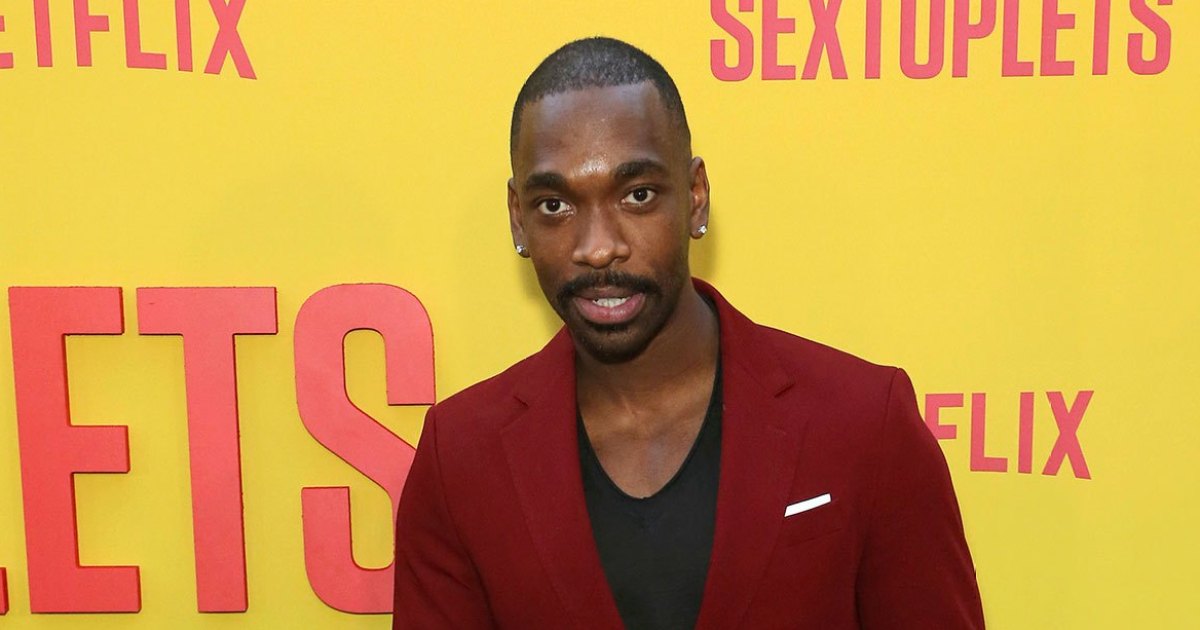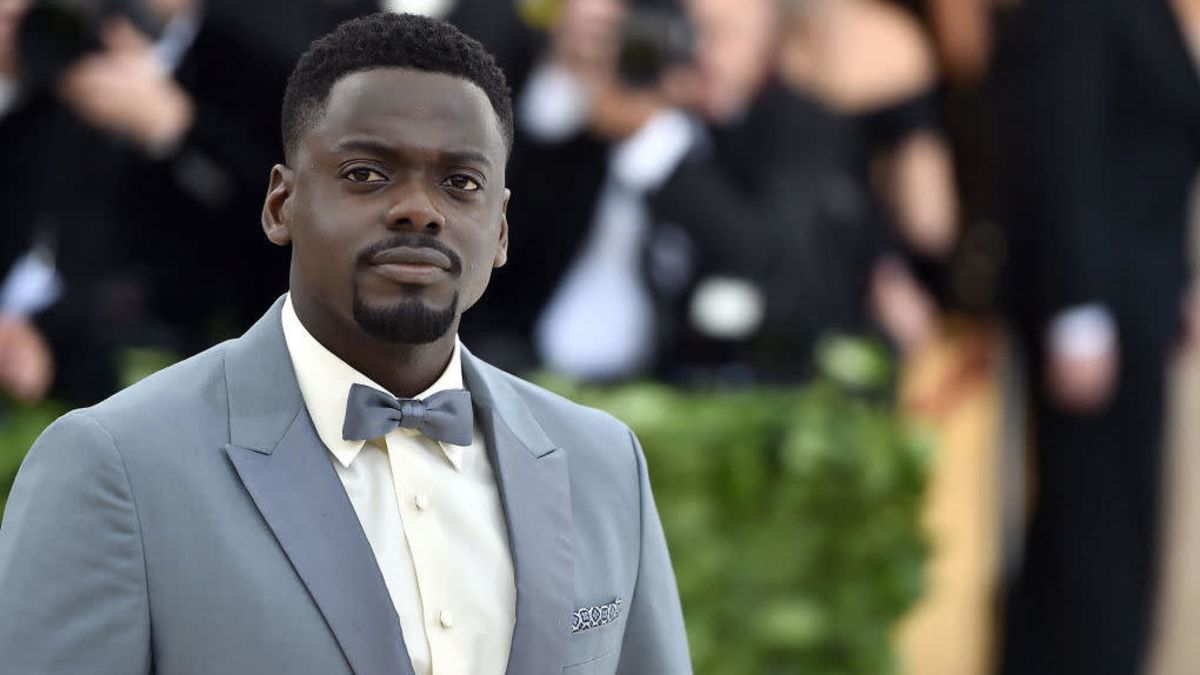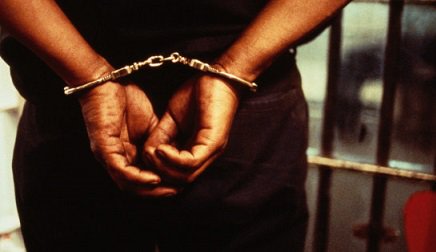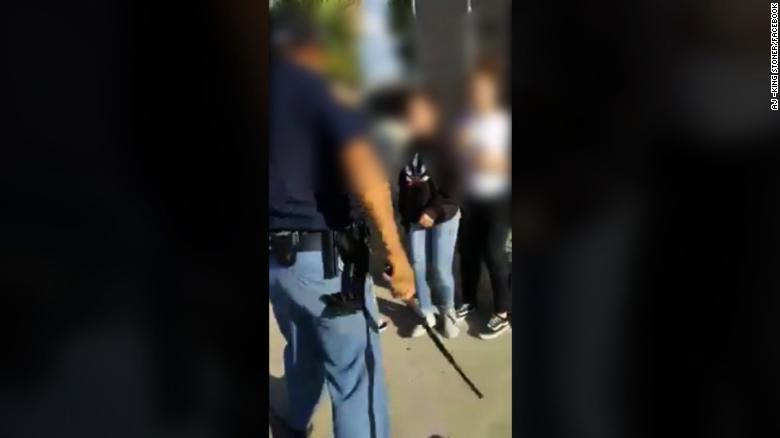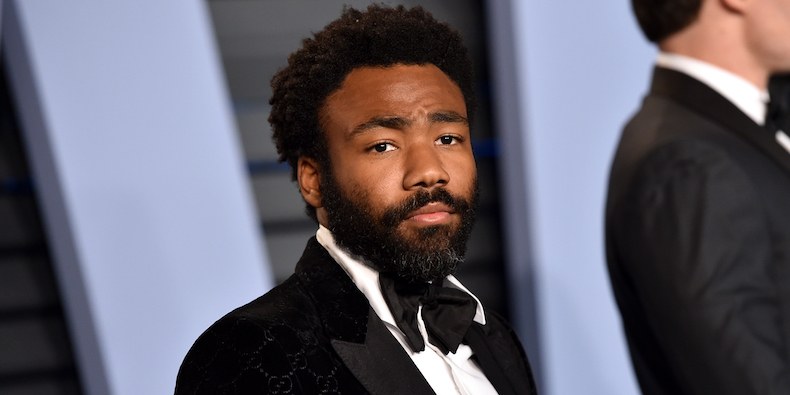Tag: police brutality
Jay Pharoah says “sorry” from LAPD cops who forcibly detained him with guns drawn is “not enough”
Former “Saturday Night Live” comedian Jay Pharoah said he was scared and confused when the Los Angeles police stopped him in April. Earlier this week, Pharoah shared a video of the encounter on Instagram.
Surveillance video shows LAPD officers running toward him with guns drawn. They ordered him to the ground and handcuffed him. Pharoah said one officer placed a knee on his neck.
The police reportedly told him he matched the description of a suspect. Pharoah, who was released a short time later, told “CBS This Morning” co-host Gayle King he was a victim of racism.
In a statement to CBS News, the LAPD said, “We are aware of the video and it’s under investigation.”
Pharoah: I’m walking across the street, and then all of a sudden I hear, “Get on the ground.” … The cop from the left of me, he’s just, he’s coming, he’s got his gun out. I don’t know what’s happening.
King: But you didn’t think they were talking to you at first, or did you?
Pharoah: I didn’t because Gayle, like I said, I don’t have any run-ins with the law. I’ve never even had a ticket. … I’ve never had guns pointed at me, Gayle. … I’ve never had handcuffs put on me.
King: So they tell you to get on the ground. Do you immediately comply?
Pharoah: They said lay on the ground and spread your arms out like an airplane. The officer comes. He gets on top of me, he puts his knee on me, he puts my hands, my arms are back here, he puts on the cuffs. … I’m shocked. I’m scared. I don’t know why I’m being detained. I’m just totally confused right now. … So they pull me up, telling me that I fit the description.
King: What was the description?
Pharoah: Description was a black man in gray sweatpants and a gray shirt.
King: Did you have on gray sweatpants and a gray T-shirt.
Pharoah: Oh yeah, I did. I did.
King: So what should they have done?
Pharoah: I think the right way to handle this situation would have been for the cops to calmly come up to me since they see I don’t have anything on me. … It should have been like, “Hey man, we’re having a problem right now. We ask you if you have your I.D. because there’s somebody who just ran, fled a scene from police officers and we’re looking for him.”
King: The officer kneeled. Where did he kneel on you?
Pharoah: The cop put his — he put his pressure, he put all of this, this is his — his knee, his leg, right here.
King: Is on your neck?
Pharoah: It was right here on the bottom of my neck.
King: This is before the George Floyd case, so in that moment, what were you thinking when he had his knee on your neck?
Pharoah: I just thought why? … Now, I do not have 8 minutes and 46 seconds of an officer being on top of me like that, obstructing my airway and choking me. I don’t have that. … Luckily, they pulled me up and I got out of it. But it’s like, why does it have to go to that extremity? … When I’m an innocent bystander. … We should never have to feel like our lives are in danger when we’re doing regular human activities. I don’t want to have to fear for my life when I’m going to Whole Foods and getting some chips and guac, or picking up a kombucha.
King: It’s the assumption that bothers you. It doesn’t seem like you were given the benefit of the doubt, does it?
Pharoah: That’s the thing, Gayle. Black people in America in general. Why do we have to feel like we’re guilty until proven innocent? Where the other side gets innocent until proven guilty? … I saw a video yesterday where there was a gentleman and the cop was trying to apprehend him. … The guy ran at him. The cop starts running. … He’s running. The suspect then gets in the car, backs out and almost hits the police officer.
King: Any shots fired?
Pharoah: No shots fired whatsoever.
King: When you said that you were scared, did you worry that you could lose your life?
Pharoah: Yes. When I see guns coming towards me, my natural instinct is, oh, snap. I could — I could die.
King: You said you were complying. Did you say, my name is?
Pharoah: I said, I don’t have my I.D. on me, but if you Google Jay Pharaoh, you will see that you’re making a serious mistake. A couple of minutes later, they came back and they said, “Oh, we got a call that you’re not the guy. Sorry, my bad.” “My bad” isn’t good enough.
King: Jay, did they say “my bad”? Did they say that?
Pharoah: They said, “I’m — oh, sorry, sorry.” That’s not enough. … There needs to be some practice with these policing, reforms. … I don’t want to see another 20 black people be martyrs for no reason.
King: Who was the first person you called after this happened to you?
Pharoah: I called my mom and I told her what happened. My dad was on the phone too and it just, you know, my mom started crying.
King: And that affects you too to see your family crying too.
Pharoah: It’s a terrible feeling that the aftermath of such a terrible situation can cause that much impact on people around you. … I hit up Steve Harvey when it happened. He said, “You got a ‘being black in America sandwich.'” And I said that’s exactly it. I’ve eaten it and I know how it tastes.
King: Being black in America sandwich. Yeah, and it don’t taste good.
Pharoah: You know what tastes good? Just being a beautiful black person.
King: Yes, that feels good, too.
Article via CBSNews
Daniel Kaluuya Opens Up About His Own Run-Ins With Police Officers: ‘It’s Been Consistent’
“The more you have respect yourself, the more problematic you are,” he told ESSENCE.
Here’s hoping that by now you have seen the glory that is Lena Waithe and Melina Matsoukas‘ Queen & Slim. The instant cultural classic stars Daniel Kaluuya and ESSENCE cover girl, Jodie-Turner Smith as two unlikely lovers, who are on the run after shooting a White police officer in self-defense.
When we sat down with Kaluuya, he shared his own experience with the police in the U.K. And it sounds sadly similar to what Black Americans go through with law enforcement.
“I first got stopped when I was 13 and it’s been consistent,” Kaluuya recalled.
In fact in 2013, the actor sued the Metropolitan Police for assault and false imprisonment after he was wrongly suspected of being a drug dealer.
“It’s this weird kind of Black male right of passage,” he continued. “The more you have respect yourself, the more problematic you are.”
Queen & Slim isn’t just a film about race relations with the police. That pain is contrasted by a beautiful Black love story onscreen. Kaluuya told ESSENCE he was shocked that it was the first time he saw two dark skinned people just being in love on the big screen.
“This reminds me of my aunties and my uncles,” Kaluuya said. “I saw that as a kid in life. I never saw that in a mainstream cinema. Even though I knew it was coming, it still jarred me how new it felt. To be a part of something like that, I feel really special.”
The film’s director, Matsoukas wanted the world to see Black love play out in a “different way” on-screen, she said. And not just Black love, but dark skinned Black love.
The Grammy Award-winner told ESSENCE, “I really hope that it represents us in a true and authentic way. I really wanted to show a love story between two dark skinned Black people. I wanted to start redefining what beauty is in this country, which has always leaned toward a more Eurocentric version of beauty. And I wanted that reflection onscreen.”
Article via Essence
Check out some Lovelyti videos:
Black Panther Movie Review
Kendrick drops “All the stars”+Black Panther Takes over Social Media #WhatDoesBlackPantherMeanToMe
Michael B. Jordan Had To See A Therapist After Playing Killmonger!~I was Sad & Depressed!?
Sandra Bland, It Turns Out, Recorded Her Own Video of Traffic Stop Confrontation
Article via NYTimes
As Trooper Brian Encinia angrily threatened her with a stun gun from just outside her car window, Sandra Bland recorded the encounter on her cellphone, shown in a newly released 39-second video that has prompted Ms. Bland’s family to call for a renewed investigation into her arrest and death nearly four years ago.
Ms. Bland, a 28-year-old African-American from Chicago, was taken into custody in southeast Texas following the confrontational 2015 traffic stop and was found hanging in a jail cell three days later in what was officially ruled a suicide. The case, which drew international attention, intensified outrage over the treatment of black people by white police officers and was considered a turning point in the Black Lives Matter movement.
The video surfaced for the first time publicly Monday night in an investigative report on the Dallas television station WFAA that included interviews with Ms. Bland’s family and supporters, who accused officials of concealing information that they say should have been made public early in the investigation.
The authorities released the trooper’s dashcam video days after Ms. Bland’s death but the fact that Ms. Bland recorded the encounter from the front seat of her car was not public knowledge. Cannon Lambert, a lawyer who represents the Bland family, said the video, by showing Ms. Bland with a cellphone in her hand, seriously undercut the trooper’s claim that he feared for his safety as he approached the woman’s vehicle.
“What the video shows is that Encinia had no reason to be in fear of his safety,” Mr. Lambert, who represented the family in a $1.9 million legal settlement, said in a telephone interview. “The video shows that he wasn’t in fear of his safety. You could see that it was a cellphone, he was looking right at it.”A memorial for Sandra Bland at the spot where she was arrested in Hempstead, Tex.CreditIlana Panich-Linsman for The New York Times

Mr. Encinia said during internal interviews with Department of Public Safety officials that he had been worried about his safety. “My safety was in jeopardy at more than one time,” he told department interviewers.
Mr. Encinia was indicted on a charge of perjury — the only criminal charge arising from the case — after grand jurors accused him of making a false statement in his claim that he removed Ms. Bland from her car to more safely conduct a traffic investigation. But the charge was later dismissed on a motion by prosecutors in exchange for the trooper’s promise that he would never again work in law enforcement.
The prosecuting team concluded that Mr. Encinia’s permanent ban from law enforcement was the best option because there was no certainty of obtaining a conviction on the perjury charge, one of the prosecutors said at the time.
Ms. Bland’s death in a largely rural part of southeast Texas unified African-American leaders throughout the state, leading to the enactment of the Sandra Bland Act in 2017, which requires training in de-escalation techniques for all police officers, sets up protections in custody for people with mental health and substance abuse issues and requires that independent law enforcement agencies investigate jail deaths
The new video recycled the tense roadside confrontation that millions of online viewers had already seen from the officer’s dashcam video and another one shot by a bystander. The main difference was the perspective — in the video newly made public, Ms. Bland is directly facing Mr. Encinia.
“Get out of the car,” the officer shouts as he thrusts a Taser toward her. “I will light you up. Get out. Now.”
Ms. Bland was pulled over near the campus of Prairie View A & M University in Waller County, where she had been planning to begin a new job, after the trooper said she failed to signal a turn. But the traffic stop became heated, and Mr. Encinia ordered Ms. Bland out of the car.
After the trooper told her to “get off the phone,” Ms. Bland responded: “I’m not on the phone. I have a right to record. This is my property.”
“Put your phone down,” Mr. Encinia repeated. “Put your phone down right now.”
The video was released by WFAA in partnership with the nonprofit Investigative Network. Its chief reporter, Brian Collister, said the video had been in the hands of law investigators until it was obtained by his news organization. Members of Ms. Bland’s family called on Texas officials to re-examine the case after Mr. Collister showed them the video, according to the WFAA report.
“Open up the case, period,” Ms. Bland’s sister, Shante Needham, told the station. “We know they have an extremely, extremely good cover-up system.”
Mr. Lambert, the family’s lawyer, told The Times that the release of the video raised questions about prosecutors’ decision not to press ahead with the perjury case, saying the recording undercut Mr. Encinia’s claim that he feared for his safety.
“So if the video showed that he had no basis of being in fear of his safety, and he lied about that, then you would think they would be using that video,” he said, calling prosecutors’ decision not pursue the case “extremely troubling.”
A team of five special prosecutors was assigned to the grand jury investigation. One of the team members Shawn McDonald, a Houston lawyer, said on Monday that he was not involved in the decision to drop the charges and pushed back at Mr. Lambert’s criticism of the team’s performance.
“For him to come back three years later is frankly quite ridiculous,” said Mr. McDonald, who added that he was “proud” of the investigation into the case.
Mr. McDonald said he first saw Ms. Bland’s video more than three years ago. “It was her cellphone so it was taken as evidence when we investigated the case,” he said.Video
Evidence typically was not released, he said, though a decision was made to release the trooper’s video shortly after the case began unfolding in an effort “to be transparent because of the concern everyone had with her arrest and subsequent suicide.”
Chip Lewis, a Houston lawyer who represented Mr. Encinia in the investigation, said his client was in a new career “wholly unrelated” to law enforcement, but he offered few details. “He’s working in the private sector, supporting his wife and family and living a quiet life,” Mr. Lewis said.
The FBI joins Texas Rangers to investigate the circumstances surrounding Sandra Bland’s death
Another Woman Of Color Dies In Police Custody After Being Told To ‘Quit Faking’ Her Pain
Trial begins Monday for Chicago officer accused of murdering black teen
CHICAGO (Reuters) – The trial of white Chicago policeman Jason Van Dyke, accused of murder in the 2014 shooting of a black teen, was set to begin on Monday in a decisive case for race relations and policing in the United States’ third-largest city.
A soundless dashboard camera video released in 2015 showed police gunning down 17-year-old Laquan McDonald. It spurred protests, fed a national debate over the use of excessive force by police against minorities and led to the ousting of local officials.
The officer, now 40, opted for a jury trial on Friday following the selection of a 12-person jury and five alternate jurors.
The jury of four men and eight women includes seven white people, three Hispanic people, one black person and one Asian person, based on appearances, the Chicago Sun-Times reported. Opening statements were expected later on Monday.
Van Dyke’s attorney, Daniel Herbert, on Monday morning asked Cook County Judge Vincent Gaughan to dismiss the jurors, saying “the negative and inflammatory rhetoric” surrounding the case had made it impossible for them to be impartial, but the judge rejected that argument. Gaughan also denied a defense motion to move the trial out of Chicago.
Van Dyke, who was suspended without pay after he was first charged in 2015, pleaded not guilty to murder and has said he felt threatened by McDonald.
McDonald was armed with a knife when he was shot. Van Dyke faces six counts of first-degree murder, 16 counts of aggravated battery – the same number of times prosecutors say McDonald was shot – and one count of official misconduct. Van Dyke is the first Chicago police officer to face a murder charge for an on-duty incident in decades.
The deaths of mostly unarmed black men at the hands of police officers across the United States in recent years have led to protests and sometimes violence in major U.S. cities. The killings, some of which were captured on video, helped give rise to the Black Lives Matter movement and became an issue in the 2016 U.S. presidential campaign.
The video, released by the city more than a year after the shooting in response to a freedom of information lawsuit, sparked days of protests in Chicago. Former Chicago police Superintendent and mayoral hopeful Garry McCarthy was fired, voters ousted the prosecutor who charged Van Dyke, and activists called for the resignation of Chicago Mayor Rahm Emanuel.
Emanuel said on Sept. 4 he would not seek a third term after facing widespread criticism over his handling of the city’s gun violence. He did not specifically cite McDonald in his announcement.
A U.S. Department of Justice investigation that began after the video’s release found that Chicago police routinely violated people’s civil rights, citing excessive force and racially discriminatory conduct.
Three Chicago Police Department officers were indicted in June 2017 for conspiring to cover up McDonald’s shooting. They have not yet been tried.
Article via: Trial begins Monday for Chicago officer accused of murdering black teen
Florida Cop Claims Police Chief Had Him Frame Two Innocent Black Men
A former Florida cop has admitted to framing two innocent black men under the direction of his boss, the chief of police.
Guillermo Ravelo, Former Biscayne Park police officer, made this admission on Thursday in federal court as part of a plea deal, according to The Miami Herald. Ravelo said he arrested one man for two home burglaries and another for five car break-ins. Charges against both men were eventually dropped.
Ravelo pleaded guilty to conspiracy to violate the men’s rights.
He also confessed to punching a handcuffed man in the face during a traffic stop, entering a guilty plea for excessive force.
The prosecution intends to recommend a lenient sentence of at least 24 months for Ravelo as part of a plea deal, reports Law & Crime. Each charge carries a maximum of 10 years in prison. The judge could choose to ignore the prosecution’s recommendation and order Ravelo to serve the terms consecutively.
Ravelo was fired from the force in March following the assault allegations from the traffic stop.
Ravelo’s admission has widened an ongoing corruption investigation of the Biscayne Park police department.
Read more via: Florida Cop Claims Police Chief Had Him Frame Two Innocent Black Men
Cops caught using coin-flip app to decide whether to arrest woman
A flip of a coin by Georgia cops determined a woman’s fate during a traffic stop in April, body camera footage showed.
The video showed Roswell police officers laughing as they used a coin-flip app to decide whether to detain Sarah Webb during a traffic stop, 11 Alive reported.
Officer Courtney Brown was heard asking Webb whether she knew how fast she was going. Webb apologized and said she was late for work, and Brown asked her to turn off the car and hand over her keys.
“The ground is wet and it’s been raining you’re going over 80 miles an hour on this type of a road. That’s reckless driving,” Brown said.
“I’m so sorry,” Webb replied.
Brown returned to her police cruiser to talk with fellow officers about whether to arrest Webb or just give her ticket.
“What do you think?” Kristee Wilson, a responding officer, was heard saying.
Brown said she “didn’t have speed detection,” but the other officer pointed out that the body camera recorded her cruiser’s speed, which would have shown how fast she was going to catch up to Webb.
Brown was then heard saying, “Hold on,” as she opens a coin-flip app on her phone. Wilson suggested that heads should mean arrest and tails should mean release. Brown agreee and flipped the coin in the app.
“A [arrest] head, R[release] tail,” Wilson said.
“OK,” Brown replied.
“This is tails, right?” Wilson asked.
“Yeah, so release?” Brown responded.
“23 [the police code for arrest],” Wilson replied.
“Michael Jordan?” Brown said while laughing. “All right, so I’ve got too fast for conditions, reckless…”
The officers decided to charge Webb with going too fast for conditions and reckless driving. Brown then arrested Webb, handcuffing her and putting her in the back of a patrol car. Webb was crying as she walked into the police cruiser. She called her employer to let her know of her arrest. Webb was not aware of the coin flip until 11 Alive obtained the video and informed her of the footage.
“Wow, these people put my freedom in the hands of a coin flip,” Webb told 11 Alive. “And that’s disgusting.”
The charges were dropped against Webb on Monday, and the case was dismissed.
Roswell Police Chief Rusty Grant told FOX 5 Atlanta that as he soon as he found out about the incident he started an internal investigation and put Brown and Wilson on paid administrative leave. He said he could not discuss details as the investigation was ongoing.
“I have much higher expectations of our police officers and I am appalled that any law enforcement officer would trivialize the decision-making process of something as important as the arrest of a person,” Grant said.
Webb said she would like to see the officers fired.
“I think they should be fired. I don’t think at all that they should be getting a paid vacation,” she said.
Article via: Cops caught using coin-flip app to decide whether to arrest woman
This Black Family Was Delivering Papers, And Guess What? Cops Were Called On Them.
T’is officially the season for calling the police on our Brothers and Sisters
A mother wanted to teach her sons about the value of hard work, and thought that a good-old-fashioned paper route was the way to do so. Instead, however, her sons learned a hard lesson about being black in America, ABC6/FOX28 reports.
Brandie Sharpe and sons Mycah, 17, and Uriah, 11, were working a paper route in a Columbus, Ohio neighborhood when they realized they’d accidentally delivered a few papers to the wrong houses.
Sharp sent Uriah to retrieve the misplaced papers and as he was doing so, the group was approached by a police officer.
“I showed him the thing for the Dispatch, The Bag, the midday week paper, that we get,” Brandie told ABC6/FOX28. “And he said ‘Oh, really?’ and by that time I was kind of like, ‘Okay, why are you questioning me about this?'”
A resident had called the police on the family.
“It looked like at first they were delivering newspapers or something, but I noticed they were walking up to the houses with nothing in hand and one of them came back with something,” the caller told the dispatcher. “I mean, I don’t want to say something was going on, but it just but it just seemed kind of suspicious.”
Sharp isn’t buying it.
“I want to know what was suspicious, what was suspicious,” Sharp told NBC4. “That an 11-year -old was up in the driveway, getting a newspaper, literally went up and came right back down.”
The incident prompted an angry Facebook post from Sharp that went viral.
“First day of paper route and we are pulled over by police … Sad I cant even teach my son the value of working without someone whispering and looking at us out the side of their eye perhaps because we DON’T ‘look like a person that belongs in their neighborhood,’” she wrote.
“Police officer pulls up and ask us questions as if we were intruding in their area. Totally disgusted and disturbed that this kind of behavior still exist [sic]. My apologies Upper Arlington for bringing my 12-year-old African American son into your neighborhood to deliver the paper and make a few dollars on the side … NO HARM INTENDED … I will make sure my boss changes his route.”
Police department spokesman Bryan McKean says the responding officer “determined very quickly that these individuals were delivering the newspaper,” and that race wasn’t a factor in the department’s response.
“If she feels she was treated unfairly by our officer, we want to hear from her,” McKean said. “We want to know what our officer did to make her feel that way so we can investigate that and we can find out.”
The Upper Arlington Police Department also issued a statement describing the incident and pointing out a law saying delivery people cannot leave papers driveways.
“For some context, [Upper Arlington] recently enacted a law placing more stringent requirements on the delivery of printed materials, such as advertising packets, to help reduce littering. Deliveries must be made to specific locations, such as on a porch or through a mail slot in the front door,” the statement read. “This has changed the patterns of delivery people, since they are required to walk up to each home to correctly deliver these materials. Residents are seeing this change in approach but may not be aware of the new law.”
Article via: Cops Called On Black Family Delivering Papers
A Texas police officer pulled his gun on a group of kids. Now, he’s doing desk duty
First, he told the children to “back up.” Then he pointed his gun at them.
A gun comes out and it’s captured on camera
Childish Gambino Collaborator Denies “This Is America” Plagiarism Allegations
Fans have suggested that Donald Glover “stole” his No. 1 single from NYC rapper Jase Harley
One of Donald Glover’s creative partners has denied claims that Glover “stole” the music for his No. 1 single“This Is America” from a March 2016 song called “American Pharaoh” by New York rapper Jase Harley. Fam Rothstein is a co-principal of the creative agency Wolf + Rothstein (which is comprised of himself, Donald Glover, and Wolf Taylor), and he also co-produced the music video for “This Is America.”
This morning, in response to a user who claimed that Glover “stole the song,” Rothstein tweeted: “The internet is a place of no consequences. I hate that Toronto Akademiks/every white blogger can say something as gospel and y’all take it. This song is 3 yrs old, and we have Pro Tools files to prove it.” Find his tweet below.
https://twitter.com/famlikefamily/status/1011244111754506240
Allegations of plagiarism against Glover surfaced on Reddit this past weekend, with Redditors citing comments on Jase Harley’s Instagram. Someone wrote to Harley, “People are saying Donald Glover bit your song ‘American Pharoah’ with ‘This Is America.’ What do you think?” Harley responded, “I always felt my song inspired it lol from the first time I heard it.”
Harley added, “It’s cool tho…. Glad they liked my song. It’s all love.” He also wrote that “a shout out would be cool,” that it’s “dope [he] could’ve had some influence on the record,” and that “all artist get inspired by others.” Find Harley’s Instagram post below.
(Article via: Childish Gambino Collaborator Denies “This Is America” Plagiarism Allegations)
https://www.instagram.com/p/BkNi0sNAtBp/?utm_source=ig_embed
#StopCallingTheCopsOnBlackPeople2018
A Black Student at Yale Was Napping in a Common Area, and a White Student Called the Police
A black graduate student at Yale who fell asleep in her dorm’s common room said she had a disturbing awakening this week when a white student flipped on the lights, told her she had no right to sleep there and called the campus police.
It was the latest in a string of recent episodes across the country in which the police have been summoned to respond to minor complaints involving people of color.
As in many of those encounters, including the arrest of two black men at a Philadelphia Starbucks and the questioning of black Airbnb guests in California, the Yale incident was captured in a widely shared video that set off anger online.
The graduate student, Lolade Siyonbola, posted a 17-minute recording of her encounter with police officers who responded to the call, and it touched a nerve, with more than 600,000 views as of Wednesday.
Ms. Siyonbola, 34, who is earning her master’s degree in African studies, said that she had camped out in the common room to work on a “marathon of papers.” On Monday night, she decided to take a nap.
Around 1:30 a.m. on Tuesday, she said, someone came in and turned on the lights, asking: “Is there someone in here? Is there someone sleeping in here? You’re not supposed to be here.”
Ms. Siyonbola said the woman told her she was going to call the police. In a shorter video that Ms. Siyonbola posted, the woman, who is not identified, says: “I have every right to call the police. You cannot sleep in that room.”
The woman, who also lives in the dorm, reported “an unauthorized person in the common room,” said Lynn Cooley, the dean of the graduate school of arts and sciences, who addressed the episode in an email to students on Tuesday.
Several officers responded to the call.
“We need to make sure that you belong here,” a female officer says in the longer video.
Ms. Siyonbola produced the key to her apartment and opened the door, and the officers told her they needed to see her ID.
After she asked why, one says, “I don’t know anybody from anybody, so I’m here just to make sure you’re supposed to be here, make sure she’s supposed to be here, and we’ll get out of your hair.”
Ms. Siyonbola relented and handed over her ID.
But the officers struggled to verify it, and Ms. Siyonbola appeared to grow more frustrated.
At one point, she says, “I am not going to justify my existence here.”
At another, an officer who identifies himself as a supervisor says, “We determine who is allowed to be here or who’s not allowed to be here, regardless of whether you feel you’re allowed to be here or not.”
“I hope that makes you feel powerful,” she responds.
The Yale Police Department referred inquiries to the university.
“We believe the Yale police who responded followed procedures,” Tom Conroy, a spokesman for the university, said on Wednesday. “As we do with every incident, we will be reviewing the call and the response of the police officers to ensure that the proper protocol was followed, and to determine if there was anything we could have done better.”
When asked if it was common practice to run IDs in such situations, he said it was.
Confirming her identity took longer than usual because the Ms. Siyonbola’s preferred name, which was printed on her ID, was different from what was in the university record, a school official said.
Late Wednesday, in an email to graduate students, Kimberly M. Goff-Crews, Yale’s vice president for student life, said that she was “deeply troubled” by the episode and that she and Dr. Cooley would hold listening sessions with students in the coming days.
“This incident and others recently reported to me underscore that we have work to do to make Yale not only excellent but also inclusive,” Ms. Goff-Crews said.
Earlier, Ms. Siyonbola called the police “ridiculous” for not leaving after seeing that she had a key and an ID. She said the larger issue was that “there are not consequences to you if you call the police on an innocent person, especially if they’re black.”
In her view, it was not an isolated incident at Yale. “I can tell you tons of other minor stories of microaggressions,” she said.
Ms. Siyonbola, who founded the Yoruba Cultural Institute in Brooklyn, is the author of a book about African history and diaspora migration. At Yale, her research focuses on migration and identity formation.
Dr. Cooley said in her email that more work needed to be done “to make Yale a truly inclusive place.”
“I am committed to redoubling our efforts to build a supportive community in which all graduate students are empowered in their intellectual pursuits and professional goals within a welcoming environment,” she wrote.
Ms. Siyonbola said she was disappointed in the dean’s response.
“It wasn’t compassionate,” she said. “It was very high-level — like we have to do better someday, somehow.”
She said she hoped this episode and others like it would prompt the administration to take action.
“This is what happens every day in America,” she added. “These things are unfortunate, they’re disappointing, they’re disheartening, but they’re not shocking anymore.”
Article via: https://www.nytimes.com/2018/05/09/nyregion/yale-black-student-nap.html


